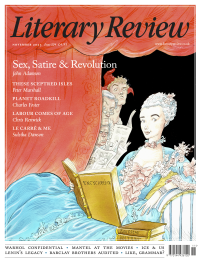Dan Franklin
No Books Please, We’re Publishers
My Back Pages: An Undeniably Personal History of Publishing 1972–2022
By Richard Charkin
Marble Hill Publishers 174pp £20
By coincidence, just before Richard Charkin’s book arrived I was reading Jeremy Lewis’s Kindred Spirits, a wonderfully funny account of his career in publishing. Subtitled ‘Adrift in Literary London’, Lewis’s book charts his progress from Geoffrey Bles, via Collins and André Deutsch, to Chatto & Windus, where he meets his nemesis in the form of the formidable and terrifying Carmen Callil. Lewis portrays himself as a diffident, mild-mannered incompetent in a corduroy suit, swept along by the tides of London publishing.
Charkin’s memoir could not be more different. The only things he and Lewis had in common were that they both worked for Oxford University Press (OUP) at one stage in their careers and that they shared a fondness for a pint in an unreconstructed pub. Charkin started at George G Harrap, which sounds quite similar to Geoffrey Bles, but within two years he had moved on to Robert Maxwell’s Pergamon Press and thence to OUP, where he was appointed biological sciences editor. It was a time of crisis for the ancient academic publisher and, to his surprise, Charkin was asked to write a strategy document about how to save it. His plan was to ‘cut the fat’, revolutionise distribution and printing, and stress profitability over academic excellence. It worked: by the mid-1980s, OUP was no longer losing money and dictionaries and reference books were about to prosper due to the boom in English-language teaching. Charkin became managing director of the academic and general division, and when the chief executive retired he hoped to get his job. When he didn’t, he approached the man who would become his mentor, Paul Hamlyn, the great entrepreneurial publisher of inexpensive illustrated books, who had just sold his Octopus group to Reed International for more than £500 million. Hamlyn helped Charkin get a job at Reed, the board of which he had joined.
It was at Reed that I first encountered Charkin. I had just started at Heinemann, one of its imprints, when the entire board of directors resigned owing to the company being acquired by Reed. They obviously knew what was coming. The chief executive of Reed was Ian Irvine, whom

Sign Up to our newsletter
Receive free articles, highlights from the archive, news, details of prizes, and much more.@Lit_Review
Follow Literary Review on Twitter
Twitter Feed
Russia’s recent efforts to destabilise the Baltic states have increased enthusiasm for the EU in these places. With Euroscepticism growing in countries like France and Germany, @owenmatth wonders whether Europe’s salvation will come from its periphery.
Owen Matthews - Sea of Troubles
Owen Matthews: Sea of Troubles - Baltic: The Future of Europe by Oliver Moody
literaryreview.co.uk
Many laptop workers will find Vincenzo Latronico’s PERFECTION sends shivers of uncomfortable recognition down their spine. I wrote about why for @Lit_Review
https://literaryreview.co.uk/hashtag-living
An insightful review by @DanielB89913888 of In Covid’s Wake (Macedo & Lee, @PrincetonUPress).
Paraphrasing: left-leaning authors critique the Covid response using right-wing arguments. A fascinating read.
via @Lit_Review